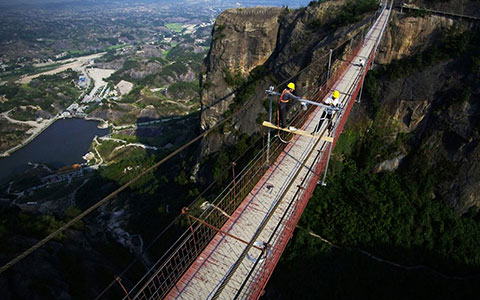Shaping China's future generations
Updated: 2015-09-15 11:05
By Hua Shengdun in Washington(China Daily USA)
|
||||||||
As China's population ages, it needs to do more to nurture its younger generations, according to participants in a panel discussion in Washington.
The topic of the discussion on Sept 10 at the Center for Strategic International Studies (CSIS) was "Youth 3D" (demographics, dynamics and development).
While China is concerned about the lost economic productivity resulting from an older population, the solution could lie in how to produce smaller yet more intelligent, educated future generations, panelists said.
CSIS has conducted extensive research on living conditions and the challenges that young Chinese are facing.
"In the year of 2000, 23 percent of the population were under the age of 15, and 10 years later, the number has gone down to only 17 percent of the population. Clearly, the population is aging. China doesn't have the population dividend anymore," said William Reese, the president of the International Youth Foundation.
"The study focuses on the domains of education, healthcare and citizen participation in the society, and quality schooling helps the youth to (make) good transitions from childhood to adulthood," Reese said. "By having the young generation earn money, civically engage with the society and be healthy, we can have the social and economic dividend from them."
Although the percentage of young people is dropping, their impact is increasing over Chinese politics, morality and economics.
"Over 50 percent of Internet users were born in or after 1990. Most of them buy stuff from necessities to luxurious products online. The Chinese Single's Day (Nov 11) generated more than $10 billion in one day in e-commerce," said Stanley Rosen, a political science professor at the University of South Carolina, in explaining why China's young are a coveted group of consumers.
But there still are problems stemming from the gender imbalance.
"The imbalanced gender ratio will increase the crimes like rape and sexual harassment to women. And there will be certain social backlash," said Ritu Sharma, a senior visiting fellow for the Youth, Prosperity and Security Initiative. "In rural areas, gender inequality is a serious problem because of selective abortion and deprivation of girls' education."
Scott Kennedy, director of the CSIS Project on Chinese Business and Political Economy, gave an example of a 6-year-old girl in the countryside. She cooked at 6 in the morning for her whole family, and her parents wouldn't allow her to go to school. Those girls are in need of support from the government and foundations, he said.
"We have got a good grasp of the problems in the context of China," Sharma said. "During the research, we realize huge potential in the Chinese young people. That is why we are seeking more policies to solve the problem and help them to fully realize their potential."
Pan Jialiang in Washington contributed to this story.

 Man tries to sell kidney for iPhone 6s
Man tries to sell kidney for iPhone 6s
 Gems of Chinese painting at Sotheby's HK auction
Gems of Chinese painting at Sotheby's HK auction
 NYFW: Tommy Hilfiger Spring/Summer 2016 collection
NYFW: Tommy Hilfiger Spring/Summer 2016 collection
 Bus decorated with 3D painting goes into service
Bus decorated with 3D painting goes into service
 Top 10 tire companies in the world
Top 10 tire companies in the world Djokovic beats Federer to win second US Open title
Djokovic beats Federer to win second US Open title
 The world in photos: Sept 7-13
The world in photos: Sept 7-13
 Hanging in the air: Workers risk life on a suspension bridge
Hanging in the air: Workers risk life on a suspension bridge
Most Viewed
Editor's Picks

|

|

|

|

|

|
Today's Top News
2015 US-China Climate Leaders Summit kicks off
Bold steps on climate to be unveiled
Parade attendees tell Houston of honor
Boeing plan for finishing center to stir up China market
Illegal margin debts probe won't crash markets: CSRC
Kissinger anticipates promising China-US ties
Germany re-imposes border controls to slow migrant arrivals
Thousands flee California wildfire as homes go up in flames
US Weekly

|

|







